|
Part V - The Transition Period
|
|
1965 was the year where everything changed. Of course, things were changing in all the years before that as well, but John Coltrane's 1965 was a watershed year where his entire approach to music levelled up. And we get plenty of albums to chart its course. Although I and others call this the transition period, it's really more of a transformation period. During A Love Supreme he was just a big flashy truck - at the end of his career he had become Optimus freakin' Prime.
The classic quartet still soldiered on towards oblivion in this period - but John was constantly experimenting with new members and configurations. Elvin and Jimmy weather the changes well, but McCoy obviously longs for the glory days of ‘61. By January ‘66 Elvin and McCoy had left the group for good. The classic quartet as we know it was dead. But the writing on the wall was there much earlier - Coltrane had finally set a path forward that the others could not follow.
|
|
Transition
Recorded: May to June 1965
Released: 1970
Label: Impulse!
John Coltrane – tenor saxophone
McCoy Tyner – piano
Jimmy Garrison – bass
Elvin Jones – drums
|
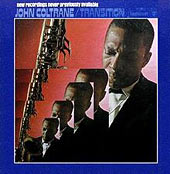
|
|
• High Tier
This is a very dense album that you may not find easy to listen to. The title track is a confusing mess, but in it Coltrane dominates throughout. You can definitely hear that he has tapped into a new kind of energy and isn't afraid to use it.
"Dear Lord" is a ballad, but a more upbeat and positive one compared to what we've heard lately. It's almost kind of catchy.
"Suite" takes us back to the dense atmospheres of the first track. In many ways it's similar to A Love Supreme with multiple clear movements. However without the benefit of separate track titles it's difficult to make heads or tails of it. Coltrane's playing is ferocious, though.
|
|
Living Space
Recorded: June 1965
Released: 1998
Label: Impulse!
John Coltrane – tenor saxophone
McCoy Tyner – piano
Jimmy Garrison – bass
Elvin Jones – drums
|
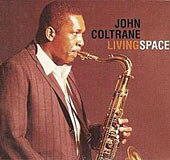
|
|
• Mid Tier
The fantastic title track features some very rare overdubbing of John in the intro and outro - it's mesmerizing though. They band kicks into a sparse, regimented groove over which Coltrane starts blasting on soprano.
There are a couple of untitled tracks on here that are pretty par for the course as far as ‘65 Coltrane goes. Although Elvin is notedly subdued. "Dusk Dawn" has a pretty long bass solo - not my favourite of Jimmy's. Outside of that it's another slow-burner with a mood that the title suggests.
Final track is "Last Blues", supposedly a very accurate title. It certainly is strange to hear Coltrane suddenly going into a jaunty, melodic blues progression - it sounds like something straight out of 1962, just with a little more squarking.
Not an essential album at all, but useful if you want to hear yet another point in the progression Coltrane made this year.
|
|
Ascension
Recorded: June 1965
Released: 1966
Label: Impulse!
John Coltrane – tenor saxophone
McCoy Tyner – piano
Jimmy Garrison – bass
Elvin Jones – drums
Freddie Hubbard – trumpet
Dewey Johnson – trumpet
Marion Brown – alto saxophone
John Tchicai – alto saxophone
Pharoah Sanders – tenor saxophone
Archie Shepp – tenor saxophone
Art Davis – bass
|
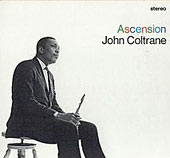
|
|
• Top Tier
One of Coltrane's most revered sessions, Ascension is the result of putting way too many young, excitable horn players in front of a colossal rhythm section. My opinion of this is that it's uneven. Some moments are truly transcendental, others are just a jumble. I highly recommend listening to this album while having the Wikipedia article open in a tab - it helpfully gives a guide to who is playing when.
There are two versions of this performance. Edition I was the original vinyl release, but was actually the second - shorter - performance recorded. Edition II was the first version recorded, but the second one issued. Coltrane actually pulled the first version from the shelves and released Edition II in its place as that was the version he preferred. On CD they're both there, but you can see why Coltrane preferred Edition II. It seems a bit more coherent than the first, and the solos are just amazing.
Making his first appearance on these sessions, Pharoah Sanders steals the spotlight. He sounds like Coltrane from the future (which is exactly what he was - listen to Coltrane's playing in 12 months' time) and is by far the highlight of all the solos. The two alto players put in a great effort too, managing to sound like Eric Dolphy on steroids. The trumpet players I'm not as huge a fan of, but their solos are pretty good - just not their contribution to the group sections.
The group sections intersperse the solos, and you can tell there wasn't a lot of planning that went into them, other than the short 4-note motif that begins and ends the performance. In many ways they're the weak point - had we just had the 30 minutes of solos with the beginning and end these pieces may have been even better. Still, there are some terrifying runs in these dense sections that are bound to impress.
If you want some real entertainment, listen to Jones, Davis, and Garrison's attempts to reign in this motley crew, especially towards the beginning. You can feel their sense of victory as they begin to establish a "groove" (if you could call it that). The parts where Davis and Garrison duet are highlights though - the double bass setup sounding as chaotic as ever, but at least it's exciting.
I'm giving this a top tier despite my criticisms, and this is because it is another giant step. Coltrane had been getting looser throughout 1965, but on this album he totally broke barriers and let free jazz take over. It may not be the easiest listen, but it's a behemoth of an album and deserves respect.
|
|
New Thing at Newport
(Split release with Archie Shepp)
Recorded: July 1965
Released: 1965
Label: Atlantic
John Coltrane – tenor saxophone
McCoy Tyner – piano
Jimmy Garrison – bass
Elvin Jones – drums
|
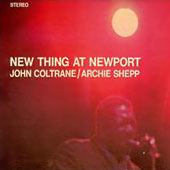
|
|
• High Tier
Coltrane and Archie Shepp were quite alike - in fact Archie had played with Coltrane back on A Love Supreme (Archie's cuts never made the final album though) and of course on Ascension. Their sets at Newport ‘65 were recorded and put on the one album. There was only one Coltrane cut on the original LP though - "One Down, One Up", however the CD version contains the full concert which also includes "My Favourite Things".
"One Down, One Up" is a different beast entirely from the performance at the Half Note club at the beginning of the year. The recording quality on this album is far superior though - it's great to hear every little cymbal and tap of the snare from Elvin. You can hear Coltrane imitating some of Pharoah's squarks in between some very angular runs.
"My Favourite Things" sees Elvin and Coltrane performing on another level compared to previous performances. Tyner is a little hesitant, but his block chords sometimes go off into journeys into uncharted territory. It's a surprisingly short little performance at 14 minutes, but Coltrane's solo gives hints as to how the song would eventually sound in its final form. The crowd screams for more but there's not enough time.
Archie's sett is interesting - instead of piano he has Bobby Hutcherson on vibes, which you will either love or hate.
|
|
Sun Ship
Recorded: August 1965
Released: 1971
Label: Impulse!
John Coltrane – tenor saxophone, soprano saxophone
McCoy Tyner – piano
Jimmy Garrison – bass
Elvin Jones – drums
|
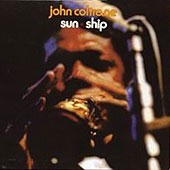
|
|
• God Tier
Sun Ship is pretty high on the challenging scale, but I actually find it highly digestible. The sound leaps out of the speakers, slapping you repeatedly with each smack of the snare. It's the perfect balance of power and subtlety that all the best Coltrane albums possess.
The opening track develops into one of the most violent jams the band did, but still keeps its cool. McCoy is finally on form here, his block chords are tremendous and he obviously is propelling Elvin into the stratosphere - his drumming is all over the place - it's an extension of the style we heard of "Resolution" from A Love Supreme - emphasizing a different beat of the bar in every single bar. The song is over as quickly as it began. Some candid dialogue begins "Dearly Beloved" where the group discusses what direction to take the song - if only we had more of this! The song sounds like a more frustrated version of "Psalm".
"Amen" is thrilling. Everyone's playing is on fire. It helps that the recording quality is superb. If Elvin's thunderous drumming and Coltrane's soprano solo don't get you revved up, I don't know what will.
"Attaining" begins as a slow reverent ballad, but quickly develops into a surprisingly straight blues - albeit a twisted one. McCoy's piano in this sounds particularly grand. The song eventually makes its way back to the start again - Coltrane finishes with the most haunting cadenza of his career.
A 6 minute bass solo leads us into the finale "Ascent". On this cut, Coltrane is melodic, confident, and bold. The rhythm section slightly more reserved. It's on tracks like this where you can hear that Coltrane was a born leader. It's because of him that others played to their full potential. It sounds like Elvin and McCoy would follow Coltrane to the ends of the earth - unfortunately they didn't, but Coltrane some who would.
In many ways this is the band's Abbey Road. One last blast like old times before they go their separate ways. Of course, the band's actual swan song was First Meditations, but that was more of a trial run for the later recording, an incomplete experiment like Let it Be. Sun Ship arrived fully formed, perfect as it is. And what a send-off.
|
|
First Meditations
Recorded: September 1965
Released: 1977
Label: Impulse!
John Coltrane – tenor saxophone, soprano saxophone
McCoy Tyner – piano
Jimmy Garrison – bass
Elvin Jones – drums
|
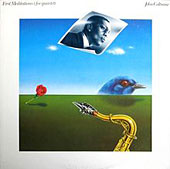
|
|
• High Tier
The first thing you should notice on this album is Coltrane's tenor tone. His tone had very nearly achieved its final form - a piercing laser beam of sound, similar to Peter Broetzmann or Albert Aayler. It was a little nasal-sounding, sure, and not as loud as Pharoah Sander's, but it could cut through anything with surgical precision.
This suite is similar again to A Love Supreme in that it is a single piece of music divided into thematically-similar movements. "Love" contains an unusually straight modal interrogation, and the band never really enters any specific time signature. "Compassion" is a slow, extremely angular groove, where it sounds like Coltrane is warming up.
Coltrane's style on this album (and "Joy" in particular) is similar to his solo on the first recording of "Impressions". Short, arresting phrases that gradually build up into a frenzy. McCoy's piano flourishes make this track deliver on the promise of its title. "Consequences" another labyrnth of a track, Coltrane really seems to be on a mission here, and McCoy sounds equally agitated. Not an easy listen.
The album finishes with the sparse "Serentity", which I would not describe as serene. McCoy's piano sounds like alarm bells at some points, and Coltrane's sax is warbley, shaking from too much vibrato. Elvin's drums are deep and muted. Jimmy bows his bass for the first time in a long time.
It's the end of an era for a legendary performing group. Soon Coltrane would begin introducing more musicians to the regular lineup. John, Elvin, McCoy, and Jimmy would never record as a quartet again.
|
|
Live in Seattle
Recorded: September 1965
Released: 1971
Label: Impulse!
John Coltrane – tenor saxophone, soprano saxophone
Pharoah Sanders – tenor saxophone
Donald Garrett – clarinet, bass
McCoy Tyner – piano
Jimmy Garrison – bass
Elvin Jones – drums
|
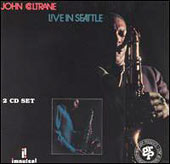
|
|
• High Tier
This lengthy album documents some live tracks that were very rarely heard elsewhere. It opens with the clattering "Cosmos", where Pharoah immediately makes his precense felt. "Out of this World" sounds nothing like the track first recorded on "Coltrane" (1962). Coltrane employs an unusual stuttering tone. It's just one of many experiments that Coltrane would perform under the influence of Pharoah Sanders, who had opened up a whole new book of possibilities to the bandleader.
"Body and Soul" keeps the tempo slow which makes for an interesting change of dynamic, especially between the piano and drums. "Evolution" is apparently an embryonic version of "Om" (which must have gestated quickly - "Om" was recorded the very next day) and opens with 9 minutes of chaotic horn interplay unsupported by any rhythm instruments. When the full band finally hits it's no less insane. The band screams out "Om" over and over - quite disconcerting.
Fan favourite "Afro Blue" begins like it's 1963 - there's an actual time signature! Elvin's drums clearly want to shift into a higher gear though - it's refreshing to hear him forcing such restraint. Tyner dominates this song with huge chords and some unusually dextrous right-hand soloing. The bass duet further in isn't for everyone but I find it quite enchanting.
Live Coltrane should come with a "beware" sign on it - all his excesses in the studio are amplified at least double on stage. This album is long, and almost impenetrable. Listen to this when you are a huge Coltrane fan, NOT when you are just trying to get into his late period.
|
|
Om
Recorded: October 1965
Released: 1968
Label: Impulse!
John Coltrane – tenor saxophone, soprano saxophone
Pharoah Sanders – tenor saxophone
Donald Garrett – bass, clarinet
Joe Brazil – flute, percussion
McCoy Tyner – piano
Jimmy Garrison – bass
Elvin Jones – drums
|
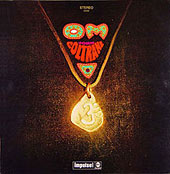
|
|
• Top Tier
If I had to give an award to the least accessible Coltrane album, this would be the one. No, it's not the noisiest, or even the harshest, but it's easily the most bizarre from a musical standpoint. The band is communicating on some entirely different wavelength to normal. None of this sounds even a bit like Ascension, even though it's obviously some sort of twisted sister album. Luckily it's a short one - just a 28 minute blast. So it's got that going for it. But woe betide anyone putting this one on unprepared - it will chew you up and spit you out.
Coltrane, then Sanders, then Tyner all solo over a bed of utter insanity provided by Elvin Jones who is now sounding nothing like himself, accompanied by Joe Brazil with some extra percussion that is just plain awesome. Underneath it all, somewhere, is Jimmy Garrison, still plugging away dutifully like nothing is out of the ordinary.
Joe switches to flute and plays like some sort of ghostly apparition, while the rest of the band howls away like wolves. Donald comes in on clarinet and sounds suspiciously like Albert Aayler. If you listen closely you can hear that the band is actually jamming on a slow ¾. Elvin's drums are chaotic but they are following a mathematical pattern. Once you figure that out, it starts to sound awesome.
Once again, this is a fantastic album if you have the taste for it, if not, it will traumatize you and put you off free jazz for life.
|
|
Kulu Sé Mama
Recorded: June to October 1965
Released: 1967
Label: Impulse!
John Coltrane – tenor saxophone, soprano saxophone
Pharoah Sanders – tenor saxophone
Donald Garrett – bass, clarinet
Frank Butler – vocals, drums
Juno Lewis – vocals, percussion
McCoy Tyner – piano
Jimmy Garrison – bass
Elvin Jones – drums
|
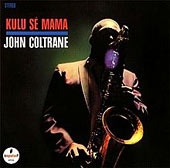
|
|
• High Tier
The original release of this album is somewhat of a compilation. The feature piece, the 18-minute title track, was recorded after Om, but the two tracks on side B, "Vigil" and "Welcome", were recorded around the time of Transition.
"Kulu se Mama" is another track that features vocals. The band jumps into a very African-inspired jam that is complimented by the awesome percussion. It's a slow 6/8 number with a steady, pulsing bassline - sounds more like something from Africa/Brass than the stuff the band has been doing recently.
"Vigil" is an Elvin/John duet that works pretty well. You can tell the two wanted to do more of these. "Welcome" is one of the most serene things recorded in the period. McCoy's piano sounds like a harp here. For the first time in a long time, Coltrane sounds like he's at peace.
|
|
Meditations
Recorded: November 1965
Released: 1966
Label: Impulse!
John Coltrane – tenor saxophone
Pharoah Sanders – tenor saxophone
McCoy Tyner — piano
Jimmy Garrison – double bass
Elvin Jones – drums
Rashied Ali – drums
|
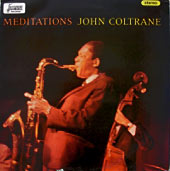
|
|
• High Tier
Many fans simply adore this album. It's probably a God Tier on quite a few people's lists. For me it doesn't quite reach those heights due to the sequencing which I think is inferior to First Meditations, which this album is a re-recording of. Still, it's a thing of complex beauty for sure - and it's not something that can be digested on the first listen.
This set dumps Joy and replaces it with "The Father and the Son and the Holy Ghost" which is a bare, haunting attack of sound. The set benefits from the added might of Rashied Ali on drums and extra percussion. When Elvin and Rashied get going together, like on "Love" after the melodic bass/saxophone intro, things seriously heat up. The set explodes into "Consequences", which sees Pharoah Sanders accompanied by both frenzied drummers and McCoy just bashing keys ad nauseum. Sanders is perhaps at his most abrasive here, and Coltrane is in the exact same mode. It can sometimes be difficult to tell the two apart.
"Serenity" finishes off the album once again to a stunning sax solo by Coltrane. McCoy's playing on this track is absolutely celestial - his final ever notes fade out with a shake of percussion and the tremor of Coltrane's sax. That was it - McCoy and Elvin would never play with Coltrane again. Coltrane took Jimmy, Elvin, and Rashied and soon added his new wife Alice on piano - off to explore regions never charted by musicians before or since.
|
Part 1 Part 2 Part 3 Part 4 Part 5 Part 6
|
|